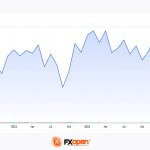The economic trajectory of the United Kingdom has consistently diverged from the more dramatic paths seen in North America, particularly during the tumultuous years of 2020 and 2021.
The UK’s approach to managing the challenges of those times was marked by a less restrictive impact on personal freedoms and economic activities, alongside a more manageable level of national debt.
Notably, the UK’s financial sector has maintained a reputation for stability, largely avoiding the high-profile collapses that have marred some of the longstanding banking institutions elsewhere. This is reflective of a broader investment philosophy within the country, which tends to favour caution over the more aggressive investment strategies often seen in the US markets.
This conservative mindset extends to the differences in market dynamics between the two countries. The NASDAQ, with its tech-centric and volatile nature, hosts a spectrum of companies from the towering ‘Magnificent 7’ of Silicon Valley to newly public entities via SPACs, embodying the American appetite for high-risk, high-reward investments. In contrast, the UK’s FTSE 100 index showcases a more traditional economic landscape, emphasising sectors like transportation, construction, energy, retail, and pharmaceuticals and embodying a more measured approach to capital growth.
Despite a recent surge in optimism, the FTSE 100 has yet to breach the elusive 8,000-point threshold. Early March saw the index nearing this milestone, reaching 7,978 points, but momentum has waned, with the index receding to 7,925.4 points. This cooling trend aligns with recent data indicating a 1% drop in UK house prices from February to March, painting a picture of a well-ordered yet static economic environment.
Chancellor Jeremy Hunt’s recent remarks highlight the UK’s lowest inflation rate in two years, yet the persistence of rising living costs and modest wage growth over the past two decades underscores a deeper economic malaise. Despite the UK’s notable financial stability and London’s status as a global financial hub, the nation’s economic policy and market dynamics suggest a preference for safety and gradual growth over the more dynamic, albeit tumultuous, investment landscape seen in the US.
This dichotomy between the US and UK investment climates reflects a fundamental choice between risk and stability, with the UK opting for a path that promises fewer shocks but potentially slower growth, in contrast to the more volatile yet growth-oriented approach of the US markets.
FXOpen offers spreads from 0.0 pips and commissions from $1.50 per lot. Enjoy trading on MT4, MT5, TickTrader or TradingView trading platforms!
This article represents the opinion of the Companies operating under the FXOpen brand only. It is not to be construed as an offer, solicitation, or recommendation with respect to products and services provided by the Companies operating under the FXOpen brand, nor is it to be considered financial advice.
Disclaimer: The subject matter and the content of this article are solely the views of the author. FinanceFeeds does not bear any legal responsibility for the content of this article and they do not reflect the viewpoint of FinanceFeeds or its editorial staff.













